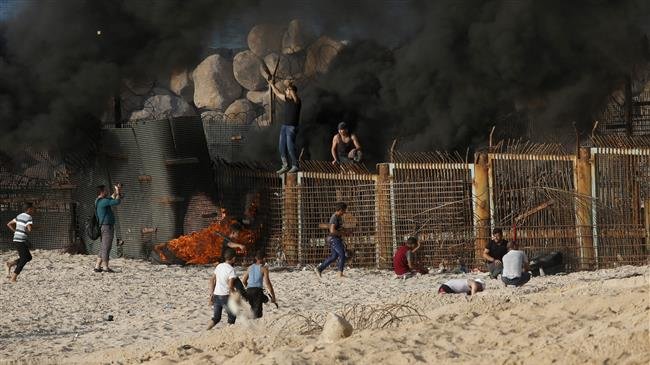
RNA - The Gazan, whose identity has yet to be disclosed, was shot late Saturday after he allegedly crossed over the fence that separates the blockaded enclave from the Israeli-occupied territories, the Israeli military said in a statement in the wake of the incident.
It added at the time the Palestinian man had been taken to the Soroka Medical Center, in Negev, in southern parts of the occupied territories, to receive due medical treatment.
However, Palestinian Ma'an News Agency, citing a statement from the medical center, confirmed on Sunday that the Gazan had succumbed to his wounds earlier in the day.
Tensions have been running high near the fence since March 30, which marked the start of a series of protests dubbed “The Great March of Return.” The Palestinian protesters have been demanding the right to return for those driven out of their homeland by Israeli wars and other acts of aggression since 1948.
The clashes in Gaza reached their peak on May 14, the eve of the 70th anniversary of Nakba Day, or the Day of Catastrophe, which coincided this year with Washington’s relocation of the US embassy from Tel Aviv to the occupied Jerusalem al-Quds.
According to Press TV, Israeli fire has taken the lives of at least 215 Palestinians since late March. More than 19,000 Palestinians have also been wounded.
On June 13, the United Nations General Assembly adopted a resolution, sponsored by Turkey and Algeria, condemning Israel for Palestinian civilian deaths in the Gaza Strip.
The resolution, which had been put forward on behalf of Arab and Muslim countries, garnered a strong majority of 120 votes in the 193-member assembly, with eight votes against and 45 abstentions.
The resolution called on UN Secretary General Antonio Guterres to make proposals within 60 days “on ways and means for ensuring the safety, protection, and well-being of the Palestinian civilian population under Israeli occupation,” including “recommendations regarding an international protection mechanism.”
It also called for “immediate steps towards ending the closure and the restrictions imposed by Israel on movement and access into and out of the Gaza Strip.”
The Gaza Strip has been under an Israeli siege since June 2007. The blockade has caused a decline in the standards of living as well as unprecedented levels of unemployment and unrelenting poverty.
847/940